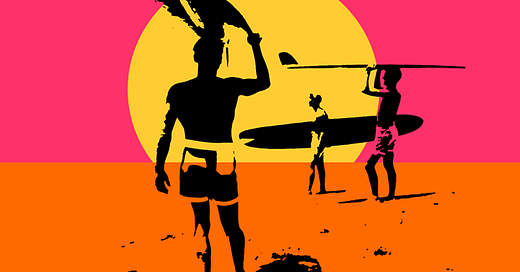i.
It’s funny. Despite being a ubiquitous facet of American consciousness for decades, particularly the latter part of the 20th Century, when documentaries weren’t quite what they have become (in terms of potential, and sheer volume—they’ve always been a genre, but where they were once on the fringe, you could probably find a demographic in today’s market that pretty much only watches documentaries, and there are enough made these days to keep them busy), The Endless Summer seems to have always been around. I’m certain I saw it, in bits and pieces on TV, in my youth, but I mostly recall it always being on display at bars, without sound, as a kind of running visual commentary or companion piece. All of which is to say, I didn’t remember much about it.
I’ve had it in my queue for ages and, with summer winding down, it seemed as good a time as any to see if it held up. It does, mostly for the same reasons it became an artistic and aesthetic touchstone, circa 1966: it’s a delivery device for the then cutting-edge footage of the world’s best surfers, riding waves. As such, it seems at once ancient (think about any footage of anything sports-related, and how it looked even twenty years ago vs. the myriad camera angle, zillion dollar production budget extravaganzas, piped on HD, that we all but take for granted) and to be riding some cultural riptide into the future.
As a historical document and time capsule, it will always be indelible, and it will correctly be namechecked as the benchmark that changed everything. As such, it’s easy recommended, especially for anyone who wants to understand and appreciate how far we’ve come, in technological terms plus production value, etc., etc. And I’ll add that I enjoyed revisiting it; it’s a genuine “feel good” story, and we see the joy and passion on full display. It’s refreshing, in its way, that we just are made to understand that these surfers are the best; there’s no backstory, no detail spent explaining the years of effort and obsession: we pick them up in mid-quest, at the top of their game, wanting to ride waves all year. What’s not to love?
Well…
The only part that marred my experience, to the extent that I almost had to turn it off, was the sojourn to Africa (the documentary follows Mike Hynson and Robert August as they go from beach to beach, starting in California and ending up in Hawaii, hitting spots like New Zealand, Australia, and Tahiti along the way). It’s during the African adventure that I was taken aback by the persistent, almost breathtakingly casual racism. And before anyone, understandably, thinks “Okay Boomer,” I am usually the one advising caution and the consideration of context whenever art/entertainment from different eras is discussed. Anyone whose sensibilities are so fragile that they won’t read/watch books/movies from fifty or one hundred years ago should be pitied for two reasons: they are missing out, and they can’t be taken seriously (except as grandstanding scolds—which of course is very 2024).
Indeed, this is why censorship is inexorably backward and counter-productive: we can’t (and shouldn’t) “cancel” classic works, especially when they can be mined for nuggets of insight and awareness (more on art & art monsters, and the dilemmas involved, here). When we see, in a text like The Endless Summer, how the “good guys” discussed “the Other” in 1966, it gives us insights into what happened during the Civil Rights struggle, how Vietnam was, for much of that conflict, framed for consumption (see: approval) by American audiences. It provides valuable perspective for how the first Gulf War happened, it at once clarifies and complicates everything that happened between 9/11 and Obama’s inauguration. This is, naturally, a complex and eternal conundrum that entire books have been written about, so in brief: when we not only don’t understand, but don’t care to understand other human beings (as equals, as human beings), it’s easier for the worst motives and actions of the few be attributed to the whole, or for fictions to be constructed to justify unconscionable acts (see: colonialism). With this diligence, painful as it is for some to accept and important it is for some to deny, it prevents us from ignoring what’s still happening, every day, here in the good old U.S.A.
But still. Perhaps it was precisely because there was no ill intent and the dialogue so innocuous that it gave me pause. There are the obligatory cannibal jokes, the “ha ha just kidding” fearmongering (see: noble or not so noble savages), and the combination of infantilization and dehumanization that perhaps stings a bit more sharply in the context of our current election with the unfortunate, appalling, and predictable direction the Republican party is heading.
It's worth lingering on this anodyne condescension; what’s striking is not that it’s derogatory (taken in the context of the time, it would have considered anything but); indeed, writer/director/narrator Bruce Brown is the archetypal laid back surfer dude, filled with good vibes and positive energy, arguably what passed for a progressive in his time. This is what seems illuminating: what, I wondered, would a documentary have sounded like twenty of forty years earlier? (And, inevitably for a book nerd, writer, and cultural critic, how much more impressive this makes Joseph Conrad who, in Heart of Darkness, was at least gamely attempting—at the turn of the previous century—to humanize these “exotic” Africans, at once bearing witness and calling attention to the putrid excess and abomination of both genocide and imperialism. A bit more on that here.)
ii.
Which brings me to a topic I never tire of opining on, which is why story is everything (in general) and why the Humanities matter (in particular). Watching The Endless Summer provides yet another reminder, when considering even some of my most intelligent and sensitive peers, particularly the ones who skew conservative: if they had taken even one or two classes (Anthropology would suffice; Sociology even better, a class or two in world lit and Cultural Studies best of all—but let’s be realistic) to understand the concept of “the other” and how “othering” has been not merely the unblinking methodology of the dominant “tribe,” but also what fascists have used forever to subjugate, and effectively unperson those without power, without voices, without access.
Would a single lecture on Orientalism (Edward Said RIP) help some western students better fathom context, and the fact that anything happening in Europe, much less Africa and Asia, has been going on for centuries, and our supersized yet immature American Empire is comparatively a newborn, still forming, yet on an accelerated path toward decline due to a historically unimaginable laziness, sloth, and solipsism?
Curiosity. That’s what’s lacking in this documentary (and what’s forever lacking when we see anyone casually able to ignore, dismiss, diminish entire cultures, usually non-white ones). Yes, understood that for the purposes of this relatively simple and straightforward documentary the subject is these two surfers and their global adventures. And yet, at every turn we are seeing the world through their dominant gaze, and each encounter is an opportunity to point out, for lack of a better and more succinct description, how non-American all these weird people are! Bruce Brown never comes straight out and says “savage” and certainly the vibe isn’t “Exterminate All The Brutes,” but the commentary accompanying their African adventure provides a neat line of demarcation for an appraisal of progress in American sociopolitical circles from, say, T.S. Eliot and Hemingway to DEI and the way mainstream media is reporting/framing the atrocities occurring in the Gaza Strip.
iii.
I’m not certain if it has anything to do with what you study in college, or the type of person you already are (of course the two are not mutually exclusive by any means) but reading a book like The Road to Wigan Pier changes you. Reading a book like The Jungle changes you. Books like Madame Bovary change you. Books like The Second Sex change you. Books like Notes From Underground change you. Books like Invisible Man change you. Then you might start reading poetry and come to appreciate what William Carlos Williams meant when he wrote “It is difficult to get the news from poems, yet men die miserably every day for lack of what is found there.” These works alter your perception of the big picture: cause and effect, agency vs. incapacity and history vs. ideology.
Put another way, even if you are open-minded and receptive to various sources of information, if your studies focus on economics, business, or political science you are already being inculcated into an established way of thinking. Liberal arts education, if it has anything going for it (and it has plenty!), reinforces and insists upon what Milan Kundera called a “furious nonidentification”. This does not mean to imply that all, or most, or even some of the students who embrace (or ascomb from) the ivory tower remain inquisitive and objective. It does mean that reading works from different cultures and different times inevitably denotes truths and facts (even if couched in fictional narratives) that are outside of time and agenda.
Writing from different cultures and different times inevitably denotes truths (even if couched in fictional narratives) that are outside of time and agenda. It is, then, easier to make connections between Irish immigrants who worked the coal mines in Pennsylvania, Lithuanian immigrants who worked in the meatpacking plants in Chicago, and Mexican immigrants—especially the illegal ones—who labor in sweltering kitchens and frigid fields all across our country. It’s impossible not to put human faces and real feelings alongside this suffering and start connecting the dots that define how exploitation works. All of a sudden, it’s less easy to espouse the impartial axioms of the Free Market and the immutable forces of commerce, or especially the notion that (in America anyway) everyone starts out at the same place and those that work hard enough and say their prayers and drink their milk will attain vast fortunes without breaking laws, stepping on innocent faces, and engaging in the oppressive pas de deux with Power (and the puny but influential people who possess it). Curiosity, in short, obliges us to more accurately discern the uneasy lines connecting our shared histories and possible futures. And then, at last, there’s a chance for recognition, empathy, culpability.








Amazing. I want to talk about this when you are on island in September. Your ability to synthesize and then articulate so much from our culture rocks me. I appreciate this immensely.